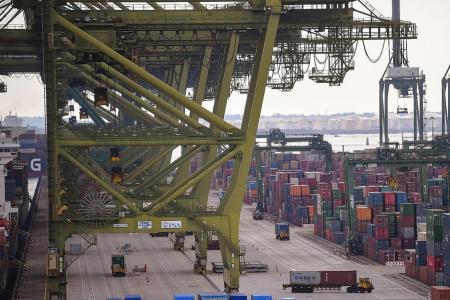Private-sector economists raise 2018 growth forecast to 3.2%
Economy to grow 3.2%, according to MAS quarterly survey
Private-sector economists have raised their growth forecast for the year, in what has been their most upbeat prediction since late 2014.
At the same time, they flagged the threat of trade protectionism as their biggest worry, which could cast a shadow on future prospects.
Economists expect the economy to grow 3.2 per cent this year, according to a Monetary Authority of Singapore (MAS) quarterly survey released yesterday. This is up from their tip of a full-year expansion of 3 per cent made in the December survey.
They expect growth to moderate to 2.8 per cent next year.
The latest 2018 prediction is within the range of 1.5 per cent to 3.5 per cent estimated by the Ministry of Trade and Industry, which tips growth to come in "slightly above the middle".
The MAS survey, which was conducted last month, recorded responses from 24 economists and analysts.
Mizuho Bank economist Vishnu Varathan said: "For one thing, the sense is that the overall global economic recovery momentum has sustained."
He cited Japan's eight consecutive quarters of growth, the broadening euro zone pick-up and an upbeat growth outlook for the US.
Since the last survey, economists have grown more optimistic about the finance and insurance, wholesale and retail trade, and accommodation and food services sectors, as well as private consumption.
But they are more pessimistic about manufacturing and non-oil domestic exports. Expectations for construction remain unchanged.
"Manufacturing growth will likely lose some steam, given the strong surge last year," said Maybank Kim Eng economist Chua Hak Bin.
Though growth in manufacturing is now expected to come in lower, the sector remains "a pillar of growth", noted United Overseas Bank economist Francis Tan.
The top potential upside for the economy, cited by 47 per cent of respondents, is that electronics will outperform expectations.
Other potential upsides include the external growth outlook and property market performance.
Trade protectionism is the main risk, cited by 88 per cent of respondents - up from just 40 per cent in the December survey.
The next largest worry was a slowdown in China's economy, with financial sector uncertainty a distant third.
Economists expect headline inflation of 0.4 per cent in this quarter and core inflation - which excludes accommodation and private road transport - of 1.5 per cent.
Get The New Paper on your phone with the free TNP app. Download from the Apple App Store or Google Play Store now



